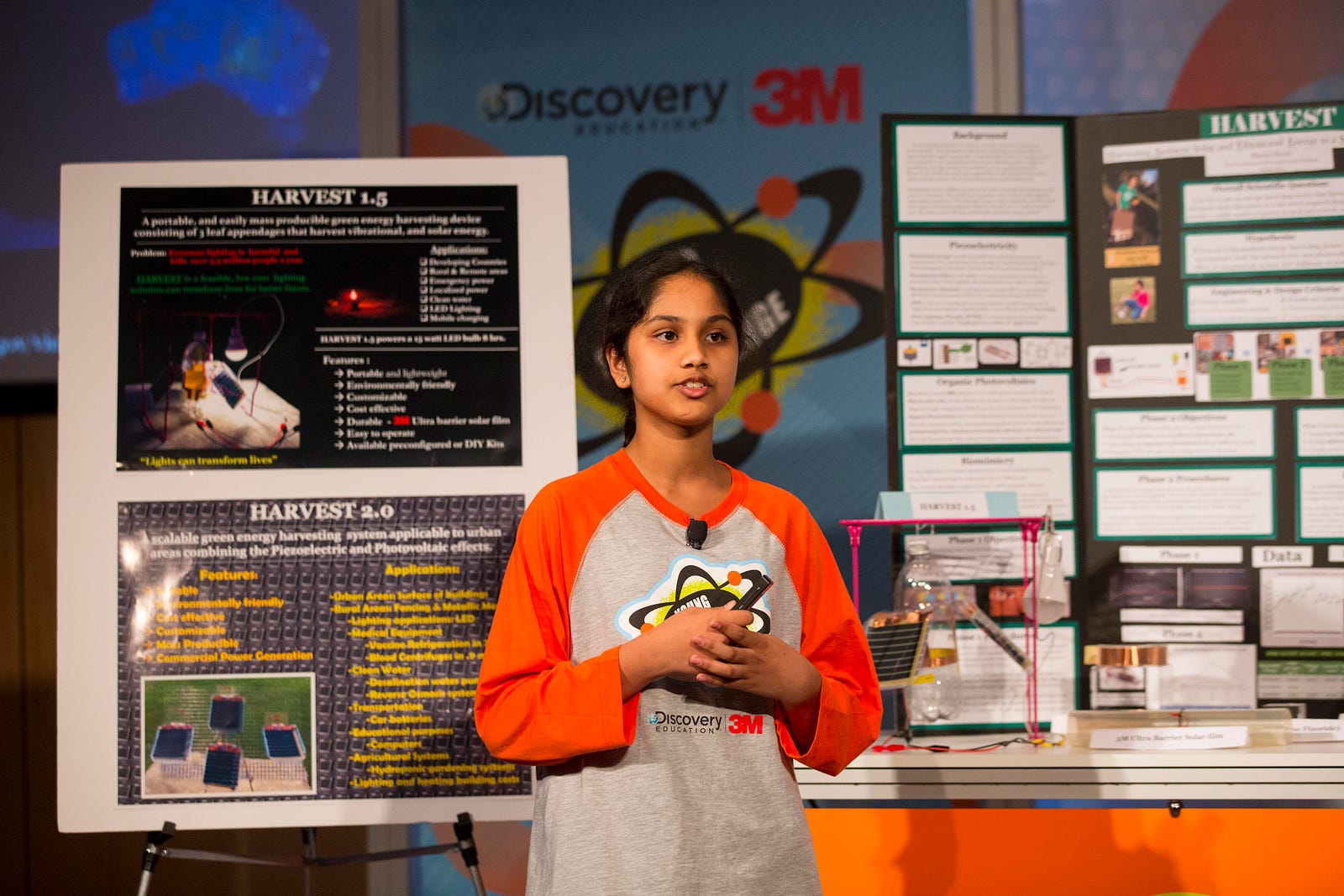The 14 Year Old That is Saving World With This $5 Machine
We’ve all heard how important it is that girls and women get involved in science, and the good news is, they are. In fact, they’re leading the charge! Today’s inspiring story is from a student in Ohio who is literally putting her scientific skills into practice. Maanasa Mendu might only be 14-years-old, but she entered the Discovery Education 3M Young Scientist Challenge with her HARVEST energy device and won first place. Maanasa’s device was created with the goal of supplying sustainable energy to third-world countries which are severely lacking.

Mannasa Mendu at the Discovery 3M Young Scientist Competition
Along with the title of America’s Top Young Scientist, Maanasa was awarded $25,000 to further her academic studies. Smart Girls caught up with her to learn about her device, and how she plans to further its reach.
SG: What inspired you to create the HARVEST device for renewable energy?
Maanasa: Every summer my family visits India, and there I experienced persistent blackouts. This meant no lighting or air conditioning for my family. But for over one fifth of the global population, darkness remains a permanent reality. Energy is fundamental to modern society and provides a sustainable source of electricity to our entire world.
SG: How does it work?
Maanasa: My bio-inspired device harvests mechanical energy in the forms of wind and precipitation through the Piezoelectric effect (an amazing phenomena in which certain materials produce electricity when exposed to mechanical strain), and solar energy through organic photovoltaics in a single design.
SG: We read that the cost of making the device was low. How did you source materials and keep the costs down?
Maanasa: Since my device targets third-world countries, I used recycled, and waste materials whenever possible, and this led to the recyclable “3 leaf harvester” being under $5.00.
SG: What is your goal with the device and how are you planning to move forward?
Maanasa: The goal of this device is to provide a stable, and sustainable source of power for basic necessities in third-world countries.
First, I plan on maximizing the efficiency of my product by testing different materials and configurations. Then, I plan to conduct further practicality testing to determine any other environmental implications. Finally, I plan on reaching out to businesses and nonprofit organizations to deploy my innovation across the world!
SG: What did you learn from your 3M mentor, Margaux Mitera, during the summer mentorship program?
Maanasa: I have learned so much from my mentor that it’s very hard to summarize the knowledge gained in a few words! Most importantly, I learned about the 4 Cs of science: creativity, communication, collaboration, and critical thinking, and the process of innovation. Innovation is more than just a lightbulb moment, it’s rather a continuous expansion very much like our universe. I’ve begun to realize the truth in the saying, “Genius is 1% inspiration and 99% perspiration-Thomas Alva Edison,” from my mentor’s awesome advice, and project experience. Whether testing for the hundredth time, researching for hours, or perfecting a presentation — nothing ever comes without hard work. Furthermore, she has truly exemplified that collaboration is key to success, taking your initial ideas and building upon them from the realizations of others, and sharing your new discoveries!
SG: Beside alternative energy solutions, what do you see as another major scientific problem area?
Maanasa: The Water Crisis -over 783 million people around the world lack access to clean water or lack cost-effective water purification technologies.
SG: It’s (maybe) early to be thinking of a career, but what is the next step for you in terms of study and other scientific projects?
Maanasa: In terms of other scientific projects, I definitely plan on taking HARVEST to the next level, and study more innovative applications of the piezoelectric effect.
SG: Is there a scientist or innovator whose work is particularly significant for you?
Maanasa: I am inspired by a number of scientists including Marie Curie, Rachel Carson, and my grandmother. Marie Curie was not only a revolutionary in her field, but also overcame male discrimination, and continues to inspire female scientists around the world. While reading a biography on Marie Curie I came across the Piezoelectric effect-it’s interesting how history can transform science (the Curies discovered the “piezoelectric effect”). Rachel Carson was a vocal scientists who went against society’s’ beliefs during her fight against DDT, and transformed the world. My mom, and grandmother are role models who not only obtained education at a time where it was discriminated but exemplify the importance of believing in yourself, and taking social responsibility.
Comments
Post a Comment